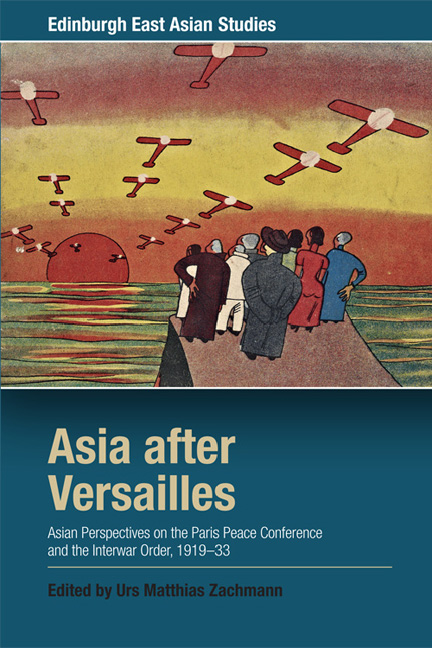 Asia after Versailles
Asia after Versailles from Part II
Published online by Cambridge University Press: 22 December 2017
The aftermath of the First World War constituted a turning point in the history of India and its national independence movement. From 1919 until the mid- 1930s, the subcontinent faced two mass campaigns that were directed against British rule and more specifically against the different constitutional reforms suggested or implemented by the British. Most Indian nationalists rejected those suggestions as not extensive enough and demanded either dominion status or swaraj (self-rule). While the two mass protest campaigns, known as the noncooperation and civil disobedience movements, respectively, constituted one way of putting forward Indian demands, other nationalists rather looked for a more conciliatory policy in dealing with the British ‘masters’. One of these moderate approaches was to suggest arbitration through the League of Nations.
This organisation, of which India was a founding member, had always held a particular position within Indian public opinion. The present chapter examines the perception of the League of Nations in Indian newspapers and journals, as well as by Indian nationalists. The main focus is on the question of how the League was seen and approached by Indian nationalists and the newspapers to make a case for India's independence.
Attempts to define public opinion entail a number of methodological problems, not least because there is no commonly acknowledged definition. In this paper, the term public opinion is used to describe ‘firmly settled convictions of a group and … the process of developing opinions’. Thereby, public opinion is understood to be expressed either by the Indian press or by public associations and nationalist movements. It is important to keep in mind that there was not just one public opinion; rather, one has to acknowledge that the views held by the Indian press and public associations were highly diversified.
India in the League of Nations – public perceptions of its status and representation
India, owing to its contribution to the First World War, and also because of public opinion within British India, was allowed not only to participate in the Paris Peace Conference in 1919, but also to sign the peace treaties along with the representatives of other sovereign states on the basis of legal equality of status.
To save this book to your Kindle, first ensure [email protected] is added to your Approved Personal Document E-mail List under your Personal Document Settings on the Manage Your Content and Devices page of your Amazon account. Then enter the ‘name’ part of your Kindle email address below. Find out more about saving to your Kindle.
Note you can select to save to either the @free.kindle.com or @kindle.com variations. ‘@free.kindle.com’ emails are free but can only be saved to your device when it is connected to wi-fi. ‘@kindle.com’ emails can be delivered even when you are not connected to wi-fi, but note that service fees apply.
Find out more about the Kindle Personal Document Service.
To save content items to your account, please confirm that you agree to abide by our usage policies. If this is the first time you use this feature, you will be asked to authorise Cambridge Core to connect with your account. Find out more about saving content to Dropbox.
To save content items to your account, please confirm that you agree to abide by our usage policies. If this is the first time you use this feature, you will be asked to authorise Cambridge Core to connect with your account. Find out more about saving content to Google Drive.